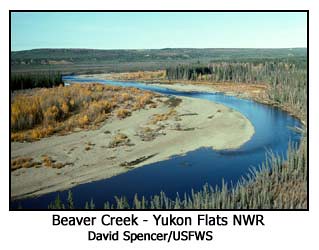The Bush administration's U.S. Fish and Wildlife Service is in the process of arranging a land swap at pristine Yukon Flats National Wildlife Refuge in Alaska, which will allow Doyon corporation to drill for oil and gas on what is now refuge property.
The U.S. Fish and Wildlife Service describes the Yukon Flats refuge as a place that "represents undeveloped wilderness, a place where the marks left by the hand of man are rarely seen," yet through this project, the Bush administration is heading down a slippery slope of swapping out protected land whenever a corporation wants to exploit the available resources.
 In 2004 the USFWS and Doyon reached an initial agreement to trade 110,000 acres of refuge land -- plus subsurface title to another 97,000 refuge acres -- for approximately 150,000 acres owned by Doyon. Doyon wants to explore and drill for oil and gas, and if these activities prove profitable, the company would probably want to acquire more refuge land for further drilling. And it should be noted, Doyon is not a green company -- their record includes a $3 million fine and 15 guilty pleas by the corporation for dumping hazardous wastes down wells.
In 2004 the USFWS and Doyon reached an initial agreement to trade 110,000 acres of refuge land -- plus subsurface title to another 97,000 refuge acres -- for approximately 150,000 acres owned by Doyon. Doyon wants to explore and drill for oil and gas, and if these activities prove profitable, the company would probably want to acquire more refuge land for further drilling. And it should be noted, Doyon is not a green company -- their record includes a $3 million fine and 15 guilty pleas by the corporation for dumping hazardous wastes down wells.
Yukon Flats NWR is a very unique place and one of the most pristine in the Refuge System. According to the Wilderness Society:
The Yukon Flats National Wildlife Refuge in eastern interior Alaska encompasses 11 million acres representing some of the most productive Arctic wildlife habitat in North America. The diverse landscape, which ranges from mountains and high alpine tundra to a vast wetland basin of rivers, streams, and more than 20,000 lakes, supports more than 150 species of birds, 39 mammals, and 18 species of fish. Known especially for its value to migratory birds, the refuge hosts the highest density of breeding ducks in Alaska. Native Gwich'in and Koyukon Athabascan people have relied on these resources for thousands of years, and subsistence activities continue to define the cultural and social fabric of the eight native villages located in and near the Refuge.
If the land swap is allowed to proceed, drilling for oil and gas will threaten wildlife and fish populations, water quality, Native American cultures, and also the wilderness and recreational values of the refuge and adjacent public lands.
According to the Wilderness Society, drilling would affect:
Wildlife populations and their habitats: Roads, noise, increased human activity, and air and water pollution will have both direct impacts to wildlife, as well as indirect impacts as a result of changes to habitat.
Chinook and chum salmon and Arctic Grayling: These fish are important food sources for local people. Their populations will likely be impacted by the large water withdrawals required by oil development, and the addition of pollutants and sediment to rivers and streams.
Water quality and recreation: The waters and scenic and recreational values of Beaver Creek and Yukon River-Beaver Creek (including a section legislatively designated as a Wild River) flows through the area of the proposed land exchange. Oil and gas development not only will impair the creek's wild and scenic character, but also will likely add pollutants and alter water temperatures, flow, and sediment loads. Other water bodies may also be affected, including some that drain into the Yukon River.
Wilderness values of the White-Crazy Mountain Potential Wilderness Area: This premier refuge wilderness is important habitat for Dall sheep and also provides a connecting corridor to adjacent public lands. Oil and gas development will require roads, pipelines, and other infrastructure sited directly through this area, also likely through the White Mountains National Recreation Area, and directly adjacent to a portion of Beaver Creek designated as a Wild River.
In addition there is concern that the impacts of oil and gas exploration will compound the effects already occurring at the refuge due to global warming, which include higher temperatures, drying lakes, changes in salmon health and migration patterns, and increased forest fires.
Tribal leaders are currently on record as being against the land swap because it threatens the land, water, plants and wildlife that they are dependent upon. "The Gwich'in people of the Yukon Flats have been dependent on the resources provided by this land for thousands of years. We are not willing to jeopardize this close relationship in exchange for a few jobs," stated Dacho Alexander, First Chief of the Gwichyaa Zhee Gwich'in Tribe in Fort Yukon. "We are acutely aware that even a minor spill could have devastating effects on the fragile ecosystem, not only here in the Yukon Flats, but along the entire Yukon watershed. We do not want to add to the effects of global warming which we are already experiencing firsthand. Therefore we will continue to protect our paradise from encroachment just as we have for the past thirty thousand years."
Last year at Doyon's annual meeting, a voice vote of Doyon shareholders voted the land trade down. Yet, the land swap goes on.
The deadline for commenting on the proposed land swap is March 25. You can submit your objections to the land swap online at the Yukon Flats NWR Draft EIS page.
You can also visit the FWS project page page for more information.
Thanks for submitting your comments and for protecting this refuge treasure.


